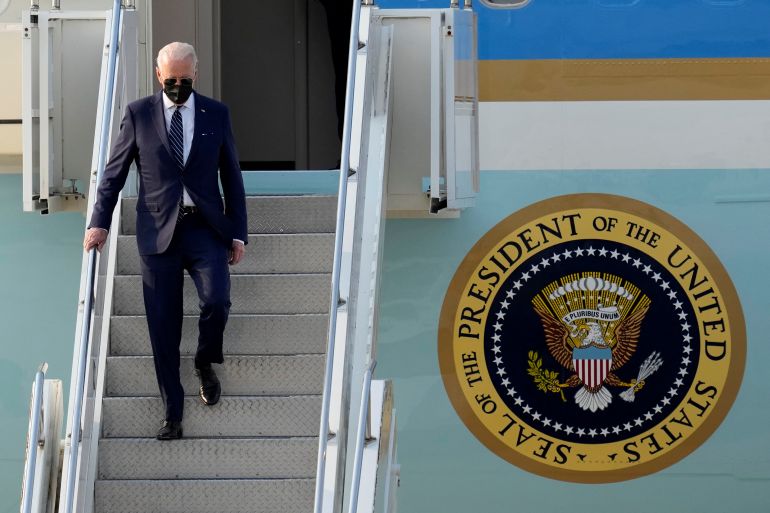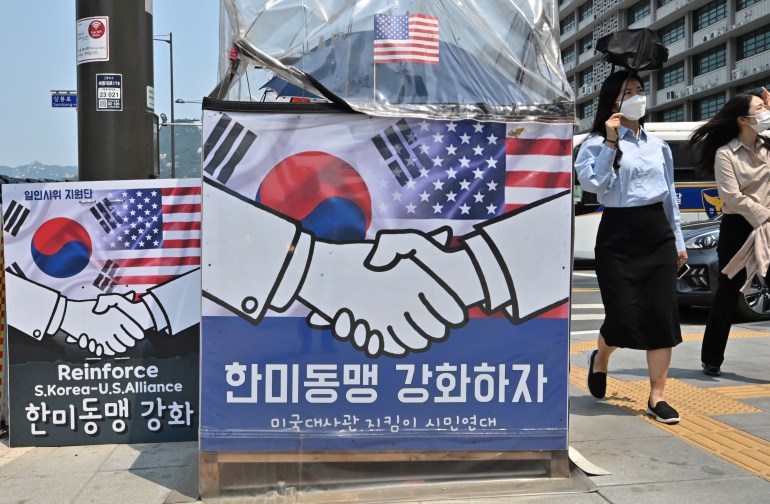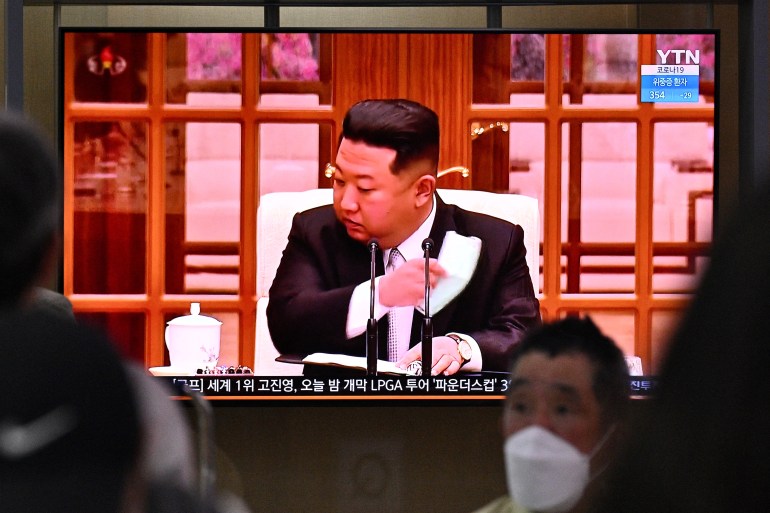Biden begins Asia tour aimed at boosting Indo-Pacific ties
US president visits South Korea and Japan to strengthen Indo-Pacific alliances amid China’s rise and Russia’s invasion of Ukraine.

Seoul, South Korea – US President Joe Biden has arrived in South Korea on the first leg of an Asia tour aimed at reinforcing Washington’s commitment to the Indo-Pacific region and countering China’s rise despite the global focus on Russia’s invasion of Ukraine.
He landed at the Osan Air Base, south of Seoul, on Friday evening.
Keep reading
list of 4 itemsBiden visit to test South Korean leader’s tough talk on China
North Korea shuns outside help as COVID catastrophe looms
Japan PM Kishida pledges further cooperation with EU on Russia
After a three-day visit that includes a summit with his South Korean counterpart, Yoon Suk-yeol, Biden will leave for Japan on Sunday for talks with Japanese Prime Minister Fumio Kishida.
The US leader’s first trip to Asia as president, however, is being overshadowed by what officials have called a “real risk of some kind of provocation” from North Korea, including a nuclear or a missile test.
Pyongyang’s nuclear programme will top the agenda in Biden’s talks in Seoul and Tokyo, as will boosting cooperation on technology, trade and security issues. Biden is also likely to push for improved relations between Washington’s two treaty allies in Asia after ties soured over historical feuds and territorial issues during the presidency of South Korea’s Moon Jae-in.
In Tokyo, Biden will also convene a summit of the leaders of the Quad grouping – which includes the US, Japan, India and Australia – and launch the Indo-Pacific Economic Framework (IPEF), an agreement that seeks to set standards on supply chains, worker protections, decarbonisation and anti-corruption.
“The main objective of Biden’s trip to Asia is to shore up the support of key Asian allies for the US’s Indo-Pacific strategy,” said Jaechun Kim, professor of international relations at South Korea’s Sogang University. “There is concern that the Biden administration has got its hands tied in Ukraine war when the real threat is China and the key region of the US interest is the Indo-Pacific, not Europe.”

Biden’s visit, therefore, is aimed at showing the US can respond to Russian aggression in Ukraine and at the same time support its Asian allies counter China’s growing economic and military clout in the region.
“Biden is of the opinion that the war in Ukraine is closely related to the success of the Indo-Pacific strategy,” said Kim.
“The Ukraine war is all about upholding the rules-based international order (RBIO), wherein sovereignty is the cardinal norm of international relations. Russia has violated that norm and invaded Ukraine. It should be stopped at all costs short of committing boots on the ground. The US Indo-Pacific is also about protecting RBIO in the region.”
Democratic alliance
The White House has said Biden’s visit is not so much about confronting China, but about sending a “powerful message” to Beijing and others about what the world could look like if democracies “stand together to shape the rules of the road”.
To that end, Biden’s Asia trip is also “fundamentally about” building personal ties with his South Korean and Japanese counterparts, White House National Security Advisor Jake Sullivan told reporters en route to South Korea.
“In both cases, he’s looking for the opportunity to just spend time to get to know these leaders … so that when they need to pick up the phone in a crisis or to respond to a major world event, there’s a baseline of trust and understanding and almost like a common operating language,” he said.
For its part, China has said it would follow Biden’s visit closely, with Chinese Foreign Minister Wang Yi lashing out against “anti-China” rhetoric and warning against “negative movements” on Taiwan, the self-governed island that it claims as its own.
Both Yoon and Kishida’s predecessors had backed US calls for “peace and stability in the Taiwan Strait” last year amid increased Chinese military pressure on Taipei.
Those statements angered Beijing, and South Korea, for whom China is the biggest trading partner, immediately downplayed the significance of that assertion. Japan, however, has stepped up the rhetoric in support of Taiwan, with Kishida saying earlier this month that any “unilateral attempt to change the status-quo by the use of force in the Indo Pacific, especially in East Asia” must never be tolerated.
Otherwise, he warned, “Ukraine may be East Asia tomorrow.”
Given the sensitivity of the issue, observers will be watching closely for statements on Taiwan during Biden’s summits with the South Korean and Japanese leaders.
For Biden, the meeting with Yoon is his first as the South Korean leader, who was elected in a closely fought election in March, only took office on May 10. The US president met Kishida in person once before, on the sidelines of the United Nations climate summit in Glasgow in November of last year, a month after the Japanese leader was elected prime minister.
Yoon on Friday sent his “sincere welcome” to the US president in the first ever tweet from his official account.
“A mountain shows its way to the summit to those who seek it,” he wrote before Biden’s arrival. “I am confident the ROK-US alliance that seeks to uphold the values of democracy and human rights shall only elevate in the future,” he added, referring to South Korea by its formal name, the Republic of Korea.
I sincerely welcome President Biden(@POTUS ) to Seoul. A mountain shows its way to the summit to those who seek it. I am confident the ROK-US alliance that seeks to uphold the values of democracy and human rights shall only elevate in the future.#ROKUSAlliance
— President Yoon Suk Yeol (@President_KR) May 19, 2022
Yoon’s priority for Biden’s visit will be to “establish the ROK-US alliance as a central axis for building and strengthening East Asia and global peace and prosperity”, an aide to the South Korean president said, particularly in the face of increased provocations from North Korea.
Pyongyang has carried out a record 16 weapons launches this year and US and South Korean officials say it may be preparing to test a nuclear weapon, perhaps during Biden’s Asian tour. That is despite the fact that the North is grappling with a coronavirus outbreak that has now infected an estimated two million people.
“There is a genuine possibility, a real risk of some kind of provocation while we’re in the region, whether in South Korea or in Japan, that could take the form of a nuclear test, the seventh nuclear test that North Korea’s conducted. It could take the form of a missile test,” Sullivan told reporters on board Air Force One, the president’s plane.
He added that Washington is prepared to respond to such an event.
“We have communicated not just our allies but with China, that this would cause the United States only to increase our fortitude in terms of defending our allies and cause adjustments to the way that our military is postured in the region.”
Seoul and Tokyo align
Yoon has pledged a tougher line on North Korea than his predecessor, including by seeking enhanced military drills with the US and the redeployment of US nuclear bombers and submarines to South Korean territory. But during his inauguration, he also promised an “audacious” economic plan if the North gave up its nuclear weapons.

Analysts say they expect the US and South Korea to pursue a North Korea policy that focuses on deterrence rather than diplomacy, unlike under Yoon’s predecessor, Moon.
“The significant conversation behind the scenes is going to be more around the question of how does the US effectively deliver credible extended deterrence to South Korea and what specific mechanisms does that look like,” said Scott Snyder, director of the Program on US-Korea Policy at the Council on Foreign Relations, a US-based think-tank.
And that includes discussions on “the positioning of nuclear-capable assets”, he said.
Another discussion point will be improving South Korea-Japan ties. This is key, analysts say, not only to address North Korea’s nuclear programme, but also to achieve the US’s vision of a “free and open Indo Pacific”.
Yoon had campaigned on a platform of seeking better ties with Japan, and as president-elect, he sent a delegation in April to deliver a letter to Kishida that expressed his desire to pursue a “forward-looking partnership” with Tokyo, while also facing up to the shared history, according to the Yonhap news agency. These include addressing the issue of Japan’s wartime forced labour and sexual slavery.
Yoon and Kishida’s desire for improved relations is a “very rare security condition”, said Youngshik Bong, research fellow at the Yonsei University’s Institute for North Korean Studies.
This is “very advantageous” for the US, which has long sought to bring the two nations together.
“For the first time in a long time, the leaderships of all three countries – South Korea, Japan, United States – are on the same page of strengthening and upgrading trilateral security cooperation,” Bong said. “If you look at past history, at least one leadership in one country has been quite cautious or passive in rendering full support for the trilateral security cooperation.
“But this time, all three leaders are on the same page.
“This will allow all three to work together to strengthen security cooperation,” he said.